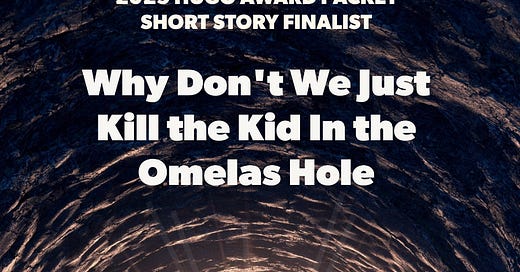Why Don't We Just Kill The Kid in the Omelas Hole
Isabel J Kim
Omelas is a very famous short story by the very famous science fiction author Ursula K. Le Guin. For the record, I think that both Le Guin and Omelas deserve their fame. Omelas is the name of a Utopian city. The first half of the text describes Omelas in all its glory. We then learn that there is a cost to this Utopian happiness. In Omelas there is a child who lives in constant unremitting suffering.
The kicker is in the final two paragraphs
At times one of the adolescent girls or boys who go see the child does not go home to weep or rage, does not, in fact, go home at all. Sometimes also a man or a woman much older falls silent for a day or two, then leaves home. These people go out into the street, and walk down the street alone. They keep walking, and walk straight out of the city of Omelas, through the beautiful gates. They keep walking across the farmlands of Omelas. Each one goes alone, youth or girl, man or woman.
Night falls; the traveler must pass down village streets, between the houses with yellow-lit windows, and on out into the darkness of the fields. Each alone, they go west or north, towards the mountains. They go on. They leave Omelas, they walk ahead into the darkness, and they do not come back. The place they go towards is a place even less imaginable to most of us than the city of happiness. I cannot describe it at all. It is possible that it does not exist. But they seem to know where they are going, the ones who walk away from Omelas.
It is heavy-handed, but Le Guin often was like that.
The rebellion of the Ones Who Walk Away from Omelas is limited to that, to walking away.
Of course, it is not meant to be plausible in any literal sense. We are, however, invited to understand that each of us lives and is happy (if we are) at the expense of the suffering of other people, and that we look away. And that even the quietest form of rebellion is yet rebellion.
Isabel J. Kim's Why Don't We Just Kill The Kid in the Omelas Hole is a finalist for the 2025 Best Short Story Hugo. It imagines an Omelas in which rebellion takes more active form. It is far more plausible than Le Guin's original story, in the sense that you can imagine, if Omelas were somehow real, that people would fight in these ways. In fact, it is too plausible. To me, reading Why Don't We Just Kill The Kid in the Omelas Hole felt like reading the news as I do every day.
It felt like a version of "Omelas" written by someone who had missed the point of the original story. I don't believe that's what it is. I am sure that Kim fully understands Le Guin, and chooses for her own reasons to deliberately place a bomb under it and blow it to the skies. Her purpose in doing this, alas, escaped me.
“Why Don't We Just Kill The Kid in the Omelas Hole” in Clarkesworld




